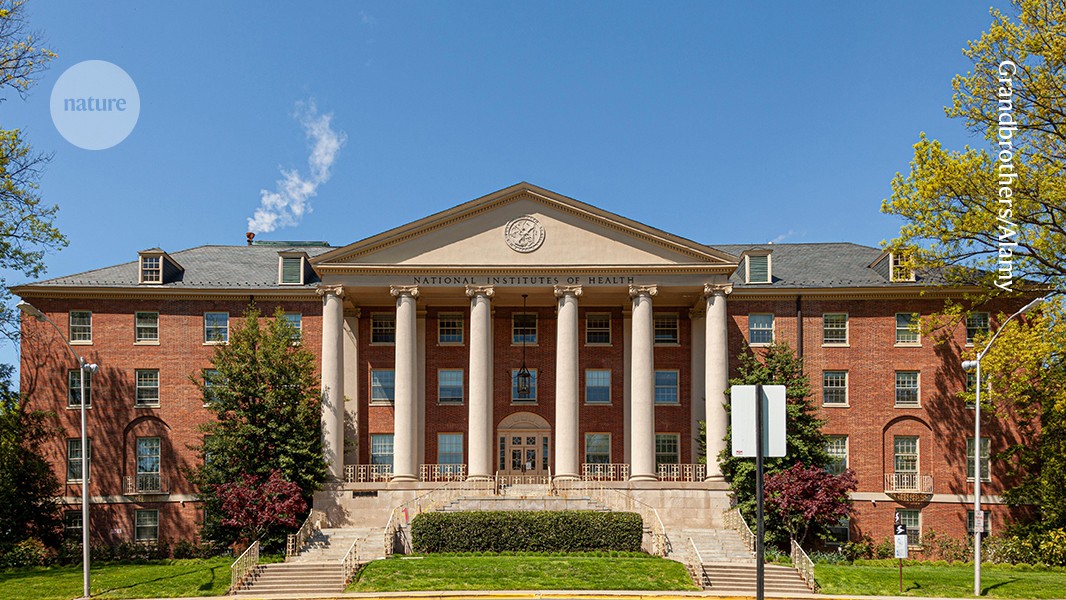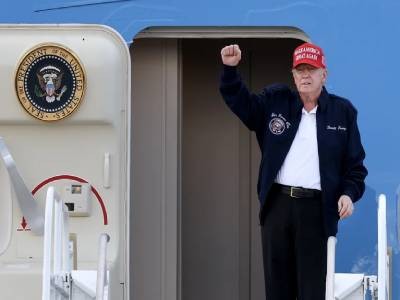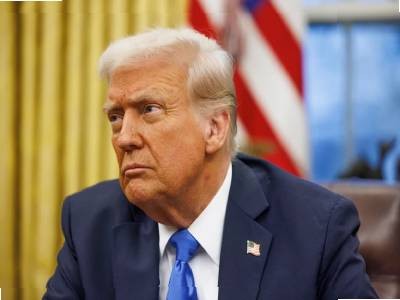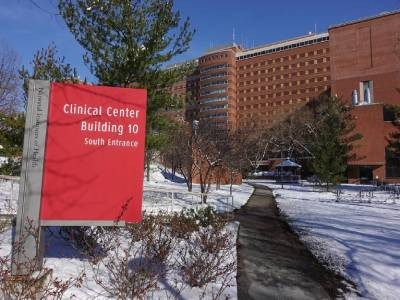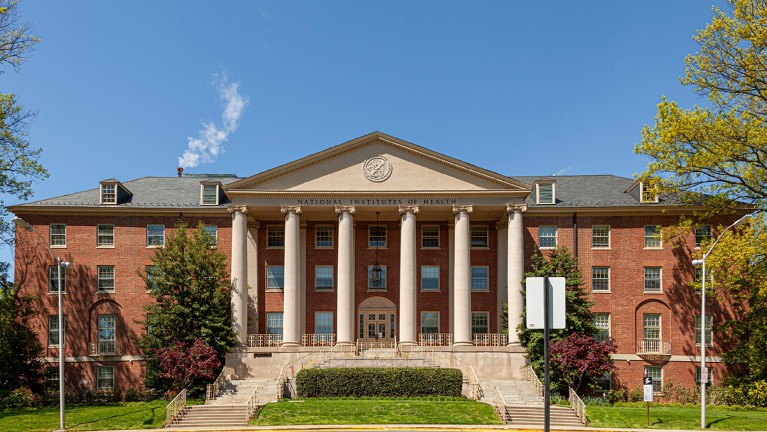
The main historical building on the campus of the US National Institutes of Health in Bethesda, Maryland.Credit: Grandbrothers/Alamy
About a month after Donald Trump took office as the 47th US president, almost all grant-review meetings remain suspended at the US National Institutes of Health (NIH), preventing the world’s largest public funder of biomedical research from spending much of its US$47 billion annual budget.
Trump’s siege of science: how the first 30 days unfolded and what’s next
These review panels are suspended because the Trump administration has barred the agency from taking a key procedural step necessary to schedule them. This has caused an indefinite lapse in funding and led scientists to make difficult decisions about the future of their research programmes.
The Trump administration issued an order on 27 January freezing payment on all federal grants and loans, but lawsuits challenging its legality were filed soon after, placing the order on hold. The fact that payments still aren’t going out because Trump’s team has halted grant-review meetings is exploiting a “loophole” in the process, says Aaron Hoskins, an RNA biochemist at the University of Wisconsin-Madison who has had to reconsider hiring graduate students because of a frozen grant application. “It’s really quite nefarious.”
Some legal scholars say this ‘backdoor’ approach to freezing funding is illegal. That’s because the US Constitution gives Congress, not the president or his team, the power to appropriate funds, says David Super, an administrative-law specialist at Georgetown University Law Center in Washington DC. Blocking “advisory-committee meetings that are legally required to make payments is no different in effect than simply refusing to sign contracts or issue checks”, he says.
The NIH did not respond to Nature’s queries about the freeze, its legality or when the freeze would be lifted.
A ‘loophole’ in the process
To gain approval, research-grant applications are considered in two steps, by two separate panels at the NIH. The first is a study section, which is a group of independent scientists who convene to score applications. The second is a meeting of the agency’s advisory council, which is a separate group of external and internal scientists that acts as a final check on an application before a funding decision is made.
Are the Trump team’s actions affecting your research? How to contact Nature
To run either of these grant-review sessions, the agency must post its meeting plans at least 15 days in advance on the Federal Register, which is the official daily publication of the US government. Trump’s team has barred NIH officials from making these posts, according to e-mail correspondence that Nature has obtained. The NIH has posted zero notices on the Federal Register since Trump took office; during the same period in 2024, there were more than 150 notices posted by the agency.
According to the e-mail, the Trump administration will require that these notices be posted at least 35 days prior to grant-review meetings in future, instead of the standard 15 in effect previously. This means that, even if these notices were allowed beginning today, the earliest a new grant-review meeting could be scheduled is 28 March.
A small number of study sections have convened since Trump took office, but that’s because a Federal Register notice was posted prior to his inauguration scheduling them. The continuing cancellation of these meetings has snowballed into an enormous backlog of applications (see ‘Trend reversal’).
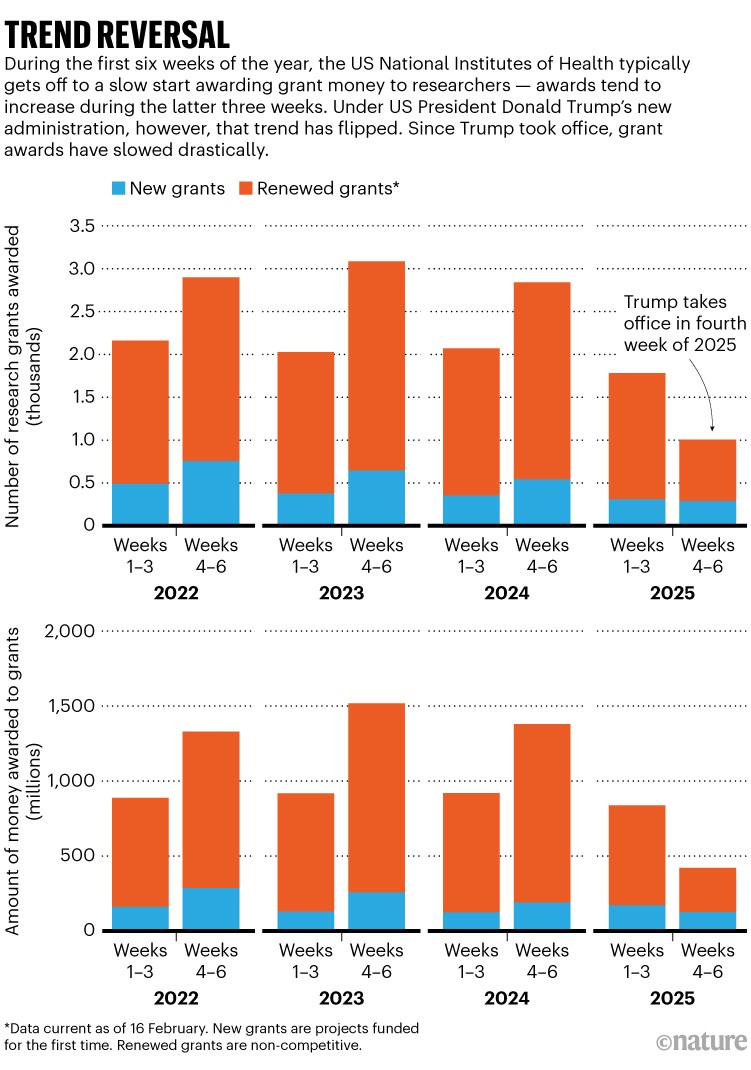
Source: NIH RePORTER database/Nature analysis (see code here)
An untenable backlog
Advisory councils at 23 of the NIH’s institutes and centres usually meet only once every four months to discuss grant applications. The first of those gatherings for 2025, scheduled between late January and early February, was cancelled by the new administration during a ‘communications pause’.
‘Devastating’ cuts to NIH grants by Trump’s team put on hold by US judge
“As we get more backed up, there will reach a point where it’ll be impossible to do peer review in time for the [second] council meeting date,” says an NIH scientific review officer, who requested anonymity because he is not authorized to speak with the press.


